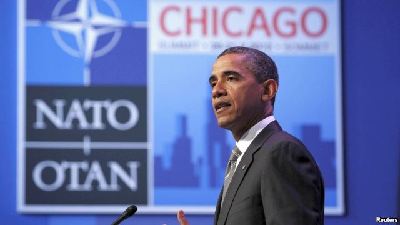Leaders of the 28 NATO countries ended their summit in Chicago on Monday, pledging an "irreversible" commitment to transition in Afghanistan. The leaders committed to greater efficiencies, while reaffirming the alliance's defense commitments.

Afghan President Hamid Karzai sat with the 28 NATO leaders and representatives of other nations whose support Afghanistan will need if it is to move from war to stability. NATO leaders formally approved the plan to transfer lead responsibility for combat operations to Afghan security forces by the middle of next year.
US President Barack Obama said this is part of a road map to wind down the war and move toward the planned withdrawal of foreign combat troops by the end of 2014.
"This will not mark the end of Afghanistan's challenges, obviously, or our partnership with that important country. But we are making substantial progress against our core objective of defeating al-Qaida and denying it safe haven, and helping Afghans to stand on their own," Obama said.
NATO is gathering commitments to pay for long-term training of Afghanistan's military. Annual costs after 2014 are put at a little more than four billion dollars and will be reviewed regularly based on the security situation.
President Obama had a brief discussion with President Asif Ali Zardari of Pakistan who was invited to Chicago by NATO. Mr. Obama said he believes there has been progress in resolving tensions over NATO supply routes that Pakistan closed last year.
Despite what he called "real improvement" in removing Taliban strongholds, President Obama called the gains in Afghanistan "fragile." But he said the strategy eventually will allow the United States to direct resources to investments needed at home.
"Whereby we can achieve a stable Afghanistan that won't be perfect, we can pull back our troops in a responsible way, and we can start rebuilding America and start making some of the massive investments we made in Afghanistan, here back home," the president said.
NATO also made decisions to ensure the alliance's viability and its capability to respond to future threats in difficult economic times.
Secretary-General Anders Fogh Rasmussen said that includes a commitment to "smart defense" strategies and resource sharing.
"We have decided to invest smartly in our defense, even in times of austerity, and we have engaged with our partners around the world to address the challenges we all face in the 21st century," he said.
Reporters asked President Obama about the demonstrations by various groups in his hometown that at times turned violent. That is part of what America is about, he said, thanking city residents for enduring traffic jams and drawing laughter when he said this:
"Despite being 15 minutes away from my house, nobody would let me go home. I was thinking I would be able to sleep in my own bed tonight. They said I would cause even worse traffic, so I ended up staying in a hotel -- which contributes to the Chicago economy," Obama said.
The NATO summit capped four days of high-level diplomacy, including Mr. Obama's hosting of the G8 summit at Camp David, Maryland.
Chicago summit exposes NATO's dilemma
Afghanistan tops agenda at NATO summit in Chicago
NATO protestors rally in Chicago
G8 summit ends with consensus on Eurozone reforms
(来源:VOA 编辑:旭燕)
